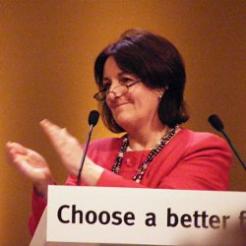Kick-starting a House of Lords debate on the voluntary sector last week, Baroness Scott called for ministers to consider putting 'lead officers' for charities in place in each government department.
The approach has recently been taken by the government for social enterprises, but Baroness Scott called for the same treatment for the voluntary sector as she opened the discussion on the voluntary sector and social enterprise on Thursday.
"The government last week announced that they are making £19m available to support social enterprises and will be placing lead officers in all the major departments to take the lead on the work. Will the government now consider a similar approach for the voluntary sector? It is always a problem for any government to deal with issues which cut across departments but it is imperative that all parts of government think about how they can make a difference," she said.
The House of Lords debate saw contributions from some 19 representatives on the issues facing the charity and social enterprise sectors. Introduced by Baroness Scott the discussion ranged from praise for the charity sector, to concerns over the implementation of contract-based service provision.
Public service contracting
Last week the government announced the appointment of Michael O'Toole as the crown representative for the voluntary sector. His appointment was to improve the government’s business relationship with the charity sector and make it easier for these organisations to tender for public contracts.
Contracts were brought into the debate by Lord Shipley who warned that the current contracting system provides larger organisations with an advantage. "The consequence is that larger organisations that cover the whole country are stepping in. These companies can afford to bid and lose, promote loss leaders and use other income streams to repay loan finance," he said, calling on the government to do more to enable smaller community groups to compete.
He praised the emergence of good leadership in the north-east from social enterprises on encouraging social value in contracting, but warned that on the matter of encouraging finance for the social enterprise sector "business support seems patchy at best, with enterprise agencies generally not having expertise in this area".
Finally he called for councils to "help up-skill" the voluntary and social enterprise sector by helping with IT, office space and "collaborative budgeting".
Volunteering debated
The importance of volunteering was also hotly debated. While many representatives praised the role of volunteers and their increasing numbers, Lord Prescott raised concerns over an over-reliance on volunteering and the potential for volunteers to be mistreated: "I wish to draw attention to the dangers that are beginning to develop as voluntary labour is brought into the commercial sector and is governed by contract, not community feeling," he said.
He looked to the case of A4E, the Work Programme provider which earlier this year saw a number of its staff arrested on allegations of fraud, and told of the move of Prospects from a non-profit to a mutual company. "The motivation then becomes not to public service but to the profitability of that investment by private companies. What begins to concern me is the conflict between the public interest involved and the private interest that is motivated by securing a profit," he said.
In particular he warned of the potential for exploitation of the unemployed if volunteering is used as a lure to attain permanent jobs, or to receive benefits. He cited one recent example where a firm receiving a £1.8m contract to train marshalls for the Jubilee celebrations saw unemployed people initially advised that they would be paid for their marshalling, and subsequently advised that the marshalling was volunteering and they would lose their benefits if they didn't do the work, Lord Prescott alleged.
The issue was also raised by Baroness Scott who said she has "real concerns about making volunteering a conditional part of receiving benefits", suggesting that instead of placing volunteers under these circumstances in charities, that bespoke social enterprises are formed for the purpose of hosting such volunteers.
The full text of the debate can be found on the House of Lords Hansard.









